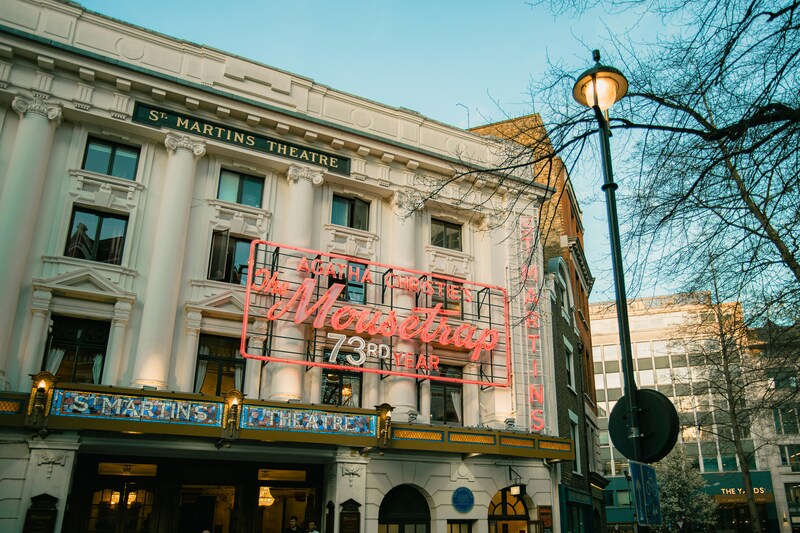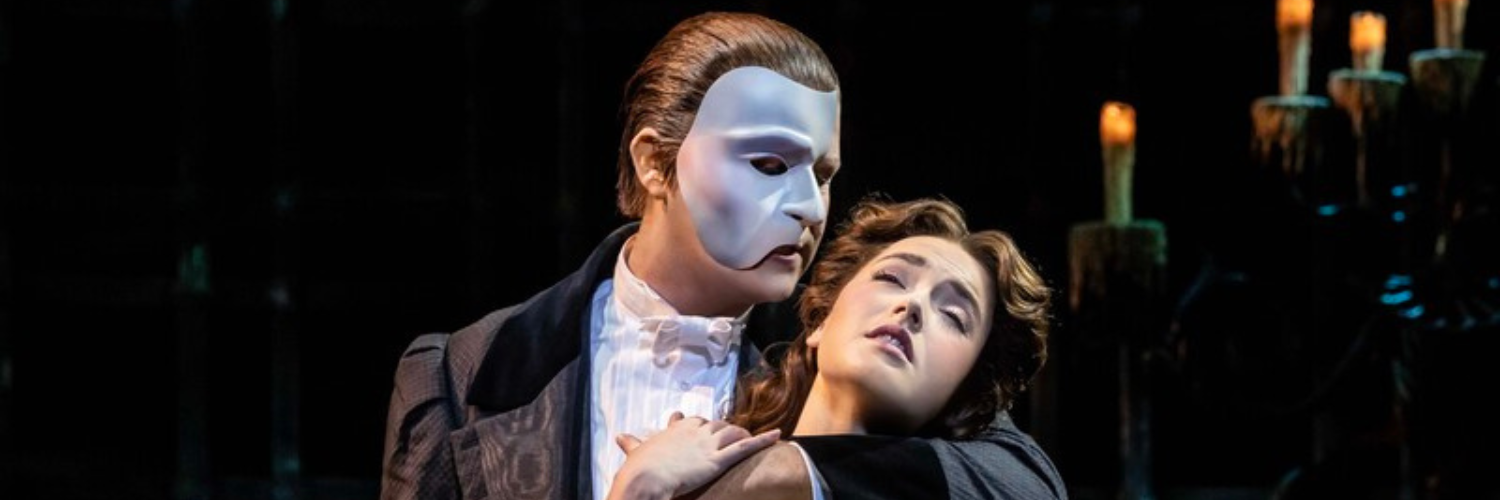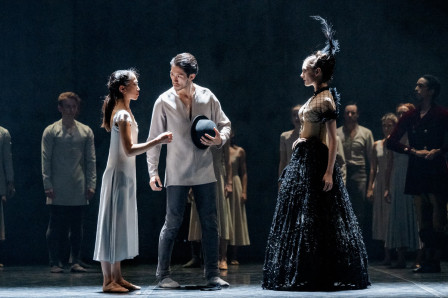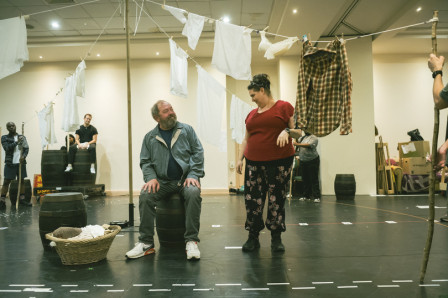A Beginner's Guide to Going to the Theatre
 Shehrazade Zafar-Arif
14 July, 2025, 09:31
Shehrazade Zafar-Arif
14 July, 2025, 09:31
Is it your first time at the theatre and you're wondering how to make the most of it? Our beginner's guide is here to help you enjoy every moment from our West End theatre experts.
 The Mousetrap at St Martins Theatre. Photo by Jackson Sears on Unsplash.
The Mousetrap at St Martins Theatre. Photo by Jackson Sears on Unsplash.
Theatre is the oldest form of entertainment, going all the way back to Ancient Greece, with roots as far as prehistoric times. There’s something wonderful about the thought that we humans have always been entertaining each other with storytelling, dance, song, and performance.
If you’re in London, there’s no better place to be for theatre. Home to some of the greatest playwrights, from Shakespeare to Pinter, London has always produced a dizzying array of theatre, meant to entertain monarchs, comment on politics, cheer up the public during wartime, or bring different cultures together. From tragedy to comedy, opera to musicals, we have it all.
But with such a vast menu of options, it can sometimes be daunting. So if you’re new to the world of theatre-going and want to know where to start, check out our beginner’s guide to making the best out of London’s wonderful and eclectic theatre scene.
When should I book my tickets?
Always try to book your tickets as far in advance as you can, ideally a month - especially for popular shows, or shows with a limited run. When the astoundingly popular Hamilton first came to the West End, many fans nabbed tickets as much as six months in advance.
However, some theatres offer last-minute deals or online rush tickets for a limited amount of time - check their websites so you know when to nab these, as they run out fast. You can even show up at the box office on the day of a performance, as there may be tickets available because of cancellations - but this is a bit of a gamble.
How do I get cheap theatre tickets?
Theatre prices in London can often be expensive, especially for in-demand shows. Your best bet is to book in advance and aim to avoid peak times like weekends, holiday periods, and the days around Christmas.
Consider also opting for the cheaper seats in a theatre - the downside is you may end up with a restricted view, cramped legroom, or a seat high up from the stage.
Some theatres offer deals for cheap tickets, whether it’s online ‘rush’ sales, or last-minute tickets for on-the-day performances, or deals for students, young people, or those who might otherwise be unable to afford tickets.
It’s a tricky time for theatres, with many of them forced to push their prices due to funding cuts to the art. But there’s also been a drive in the industry to ensure theatre remains accessible to everyone regardless of income or background, as it was always meant to be.
How do I decide which seats to choose?
It depends on what your priority is when it comes to your viewing experience: proximity to the stage or a panoramic view, whether or not you’re on a budget, if you don’t mind having to lean around a pillar or have slightly cramped legroom in exchange for paying less. Check out our guide to choosing a seat for a breakdown of the different types of seats in a theatre and the pros and cons of each one.
As with ticket prices, the cheaper seats sometimes come at a cost, in this case, comfort or visibility, but restricted view isn’t always as bad as the name makes it sound. It’s always a good idea to check a theatre’s seat plans and crosscheck with seat reviews on websites like WhichSeats so you know what to expect.
But don’t overthink it. In the Elizabethan era, people used to say they were going to ‘hear a play’ rather than going to ‘see a play’ as we would say today. Listening can be the most important part of experiencing theatre.
If you do need a last-minute ticket, consider booking for off-peak days and times, like weekdays or matinee performances.
 Disney's The Lion King is a hugely popular musical for families in the West End.
Disney's The Lion King is a hugely popular musical for families in the West End.
What time should I show up to the theatre?
Aim to arrive at least 30 minutes before the show starts. This gives you plenty of time for security checks, to buy food and drink, and to find your seat. It’s also a great opportunity to explore the theatre - many of which are large and beautiful spaces - and check out the merchandise stall or gift shop. Be warned, if you arrive after the show starts, you may not be allowed into the auditorium until an appropriate moment when you can slip in without disturbing the performance, so you may miss crucial parts of the play.
Can I take photos or videos of the performance?
Photos and videos are strictly not allowed during the performance, as they may distract the actors and disturb other audience members. Put your phone on airplane mode and take advantage of the screen-free time to enjoy the moment. You’ll have plenty of chances to take photos of the theatre or selfies before and after the show, or during the interval, and an opportunity to take pictures of the cast during their bows once the show is over.
Can I sing along during musical segments?
As a courtesy to your fellow audience members and to the actors, please refrain from talking or singing during the performance. Some musicals, such as SIX, offer designated sing-along performances where audiences are encouraged to sing along. Some shows, like Mamma Mia, also invite audiences to sing and dance along during encore performances, so please wait until you’re asked to participate.
Most major musicals also have official cast recordings on music streaming platforms, so if you fell in love with a particular soundtrack, you can go home, listen to, and sing along to your favourite songs whenever you want.
Will I be able to meet the cast?
It’s possible, but not always guaranteed. Cast members may sometimes come to the stage door, to the side or rear of the theatre, to meet audience members, take photos, and sign autographs. Typically, you will be told beforehand, while booking or at the end of the show, if the actors have agreed to do this. Bear in mind that actors may be tired after a performance or have other commitments, so please be patient and respectful of their time.
 The Phantom of the Opera is the second longest-running musical in the West End. Photo by Johan Persson.
The Phantom of the Opera is the second longest-running musical in the West End. Photo by Johan Persson.
Is there a dress code?
Once upon a time, people used to dress up to go to the theatre, but these days, there’s no formal dress code. Wear what you feel comfortable in, especially as you’re going to be sitting for long stretches of time, and consider bringing a jacket as some theatres can get cold. Of course, going to the theatre is still a special occasion, so don’t be shy about dressing up if you feel like it.
For certain shows, it’s not unusual to see fans accessorising their outfits to show their love and excitement for the show’s content. So if you’re keen to don a flapper dress for The Great Gatsby, or if you and your best friend want to cosplay as Elphaba and Glinda for Wicked - go ahead! Just as long as your costume doesn’t disturb your fellow audience members (so maybe leave the witch’s hat at home).
Can I go to the theatre alone?
Absolutely. While theatre is a communal experience, there’s no reason why you can’t enjoy it by yourself. Sometimes going solo makes it easier to immerse yourself in the show without any distractions. So if there’s a show you’re dying to see and none of your friends and family want to see it, treat yourself and make an evening of it.
Theatre is something that can be enjoyed regardless of the company - whether you’re by yourself, on a date, with your family, or with a big group of friends.
Can I take my children to the theatre?
Most theatres do not admit children under a certain age (typically toddlers and babies). Shows tend to be long, which means young children are likely to get bored or restless. But it’s a great idea to introduce your children to theatre from a young age. Opt for child-friendly shows, like Disney musicals or stage adaptations of children’s books. Musicals in general are typically great for kids as they’re less dialogue heavy and usually have a simpler plot. For infants, there are also sing-along family shows that encourage children to participate and play along to the show.
How do I decide which show to see?
The most important question.
Here in London, we’re lucky to be spoiled for choice when it comes to the different options of what to go see (or hear!) at the theatre, and this can often lead to decision fatigue. So before you decide, have a think about what you’re hoping to get out of the experience.
Do you want something serious and complex that will give you plenty to think about, or something fun and light-hearted to lift your spirits?
Do you want to experience something new and outside your comfort zone or relive a familiar and beloved story?
Do you want something cozy and intimate or something large and bombastic?
Check out our Theatre Guides for a breakdown of the most popular shows in each category. If you’re leaning towards our musical, our guide to London’s musicals offers a summary of the different types of musicals. If you’re interested in seeing a particular show but not sure if you’ll enjoy it, have a look at the reviews page on our website to see what our theatre-savvy reviewers are saying.
Whatever you choose, you’re sure to have a great time. The magic of theatre lies in experiencing something special and unique that exists solely in that moment. So whether you’re there to laugh or cry, marvelling at special effects or awestruck at powerful dialogue, we can bet it’ll be a memorable night.
Latest News

 New London Theatre shows to look out for in February 2026
19 January 2026 at 16:09
New London Theatre shows to look out for in February 2026
19 January 2026 at 16:09

 Cast announced for major London revival of The Holy Rosenbergs
19 January 2026 at 09:00
Cast announced for major London revival of The Holy Rosenbergs
19 January 2026 at 09:00

 Akram Khan's Giselle at London Coliseum review
18 January 2026 at 20:39
Akram Khan's Giselle at London Coliseum review
18 January 2026 at 20:39

 The Unlikely Pilgrimage of Harold Fry at Theatre Royal Haymarket - Rehearsal images released
16 January 2026 at 15:41
The Unlikely Pilgrimage of Harold Fry at Theatre Royal Haymarket - Rehearsal images released
16 January 2026 at 15:41